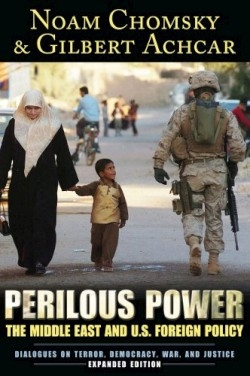Perilous Power
Dialogues on Terror, Democracy, War, and Justice
Politicians boast about spreading democracy. Armed forces clash. Civilians suffer and die. Pundits debate. Solutions are illusive. Another grand plan collapses into rubble. In the season of political change, many books have appeared with analysis and policy proposals written to advise the new U.S. president. Noam Chomsky, MIT Linguistics professor and prolific writer whose books include 9-11 and Failed States, and Gilbert Achcar, professor at the University of London’s School of Oriental and African Studies and au-thor of The Clash of Barbarisms and The 33-Day War, reissue their extended conversation about the nature and history of Middle East conflicts and U.S. foreign policy.
Both agree that this rise of terrorism and Islamic fundamentalism is the direct outcome of U.S. policy decisions that stretch back over decades of interventions, overthrows, and manipulation. Many of the secular movements such as Gamal Abdel-Nasser’s pan-Arab nationalism and socialist and communist elements in the Palestinian struggle were considered counter to U.S. interests. The arming of the Mujahideen against the USSR in Afghanistan in the 1980s and the support for the ultra-conservative Wahhabis Islamic sect in Saudi Arabia, contributed to the weakening of secular nationalism and strengthened Islamic fundamentalism. So did the 1953 overthrow of the democratically elected prime minister of Iran, Mohammed Mossadegh, and the installa-tion of the bloody pro-U.S. Shah; the 1977 backing of General Muhammad Zia-ul-Haq in Pakistan; and the 2003 invasion and occupation of Iraq.
According to Chomsky, the U.S. repeatedly finds itself in the position of opposing democratic elections in places like Egypt, Lebanon, and Palestine because, “The wrong people might win”—like the Muslim Brotherhood, Hezbollah, or Hamas. “They support democracy if and only if it conforms to U.S. economic and strategic objectives.”
During their in-depth and riveting discussion, Chomsky and Achcar review the modern history of the U.S. involvement in the Middle East and discuss many of the nuances that are left out of the sound-bite-loving news cycle. The book has been updated from the hard-cover release to include additional conversations from March 2008.
Seyom Brown’s approach in Higher Realism is to focus on a guiding philosophy to organize foreign policy. Taken together, these two books provide background and several possible paths for the next administration to take in foreign relations and the resolution of international conflicts. The wars in Iraq and Afghanistan, the fears of a new pandemic, global warming, the prolifera-tion of nuclear weapons, hunger-driven food riots, the Israeli-Palestinian conflict, and the worldwide financial crisis are events that will touch each and every one of us. These authors feel strongly that it is in the interest of humanity that U.S. foreign policy catches up with that reality. Foreign policy experts and ordinary readers will benefit from deeply analytical studies like these.
Reviewed by
Aaron Brooks
Disclosure: This article is not an endorsement, but a review. The publisher of this book provided free copies of the book to have their book reviewed by a professional reviewer. No fee was paid by the publisher for this review. Foreword Reviews only recommends books that we love. Foreword Magazine, Inc. is disclosing this in accordance with the Federal Trade Commission’s 16 CFR, Part 255.

